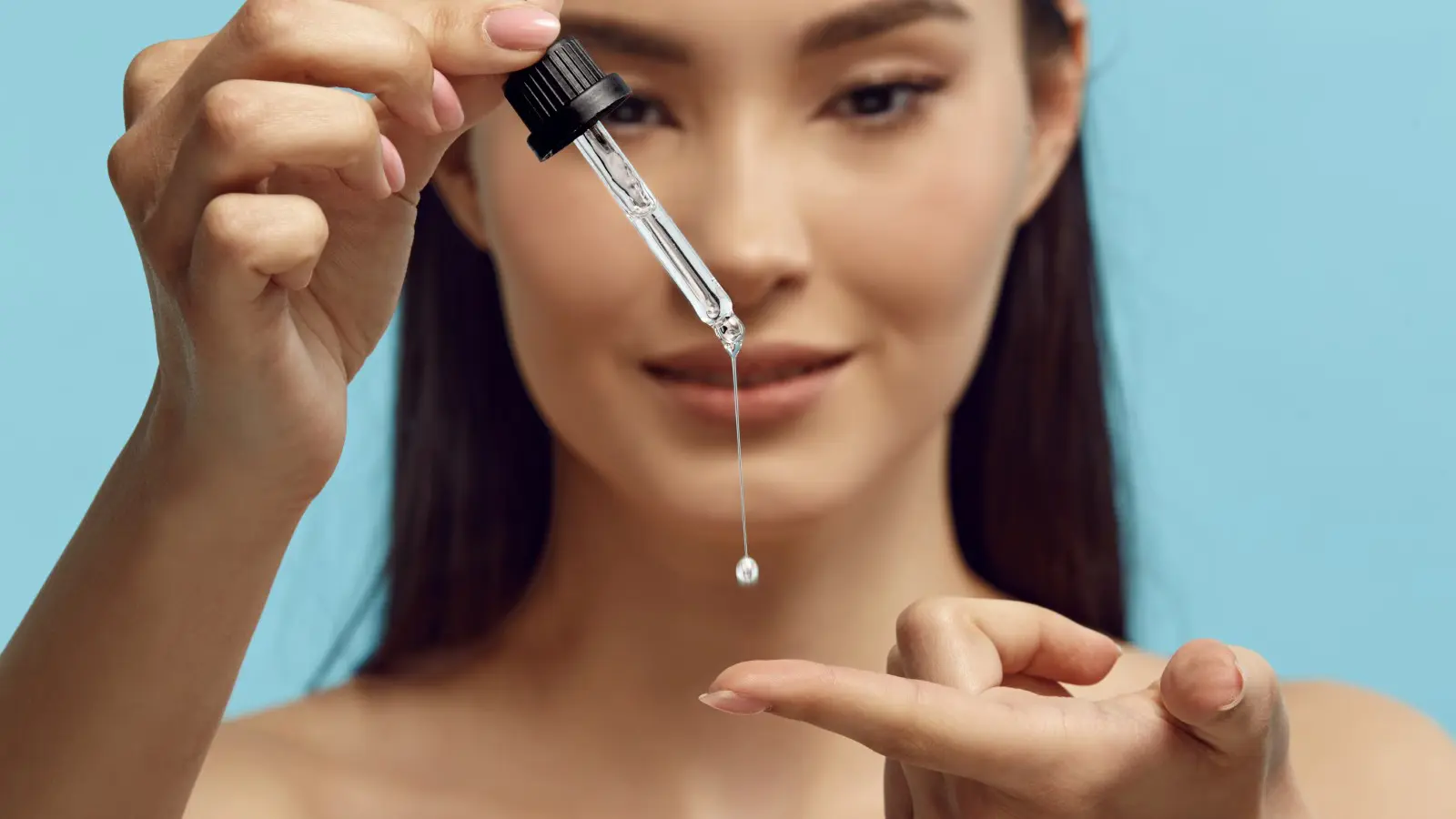Increase Skin Elasticity: 12 Best Ways to Fight Ageing
Skin elasticity makes your skin appear healthy and full. However, losing it as you age can cause sagging and wrinkled skin. Here are twelve strategies to improve skin elasticity.
Anti aging treatments

Use hyaluronic acid-based moisturizers to get radiant skin. Image courtesy: Adobe Stock
Increase Skin Elasticity
Skin aging is a normal process, and there comes a point when you see your skin drooping somewhat. Ever wonder why this occurs? Elastosis is a disorder in which your skin gradually loses its flexibility as you age. Skin elasticity is essential for preserving young and healthy skin. Without it, your skin may become sagging, wrinkled, dry, and dull. Elastosis is more common in sun-exposed skin areas. While decreasing skin elasticity is a normal aspect of aging, there are various effective strategies to fight these effects and postpone the appearance of skin aging.
[web_stories title=”false” excerpt=”false” author=”false” date=”false” archive_link=”true” archive_link_label=”” circle_size=”150″ sharp_corners=”false” image_alignment=”left” number_of_columns=”1″ number_of_stories=”5″ order=”DESC” orderby=”post_title” view=”circles” /]
12 techniques to improve skin elasticity
Here are some techniques to promote skin elasticity and preserve healthy, beautiful skin:
Also Read: Skin Elasticity: 13 Ways to Improve It
How to increase skin Elasticity?
Increase Skin Elasticity
Best skin elasticity tips
1. Collagen Supplements
Collagen is an important protein for skin structure, firmness, and suppleness. As we age, collagen synthesis declines, resulting in wrinkles and sagging. Taking collagen supplements, usually in the form of powders or capsules, can help replace collagen levels in the body. A research published in Clinical, Cosmetic, and Investigative Dermatology reveals that taking collagen supplements on a daily basis can enhance skin elasticity, firmness, and moisture while also reducing wrinkles.
2. Hyaluronic Acid.
The skin contains hyaluronic acid, which helps it maintain moisture. “It works as a humectant, drawing water and keeping the skin moisturized. However, insufficient amounts of it can cause dry, aging, and sagging skin, according to dermatologist Dr. Ishmeet Kaur. Topical hyaluronic acid treatments can help restore skin elasticity by increasing hydration, according to a research published in Dermato-endocrinology. To maintain ideal skin moisture levels, use serums or creams containing hyaluronic acid on a regular basis.

Maintaining skin suppleness is critical for keeping skin youthful and healthy. Image credit: Adobe Stock.
3. Antioxidants
Free radical damage has been related to a variety of chronic health conditions, including cardiovascular and inflammatory illnesses, cataracts, cancer, and skin problems. According to research published in Pharmacognosy Reviews, antioxidants help protect the skin from free radicals, which can cause skin aging and loss of suppleness. Topical antioxidants, such as vitamins C and E, as well as green tea extract, can neutralize these toxic free radicals and aid in skin restoration. Use antioxidant-rich skincare products, such as creams and serums, to reduce fine wrinkles and improve overall skin texture.
4 Vitamin C
improve skin firmness
“Vitamin C is a potent antioxidant that plays a crucial role in not only collagen synthesis but also in increasing the levels of hyaluronic acid,” according to Dr. Kaur. It protects the skin from UV rays and promotes the healing of damaged skin cells. Vitamin C serums and lotions can help lighten the skin, eliminate dark spots, and increase suppleness.
5. Retinol and Retinoids.
Retinol and retinoids are vitamin A derivatives with well-documented anti-aging properties. According to a research published in Skin Pharmacology and Physiology, combining topical retinol skin care products with vitamin C can enhance cell turnover, increase collagen formation, and improve skin texture. Add retinol or retinoid products to your regular skin care regimen to eliminate wrinkles and enhance skin suppleness.

Retinol can benefit your skin. Image credit: Adobe Stock.
6. Sunscreen
Sun exposure is a major cause of skin aging and loss of suppleness. UV radiation can degrade collagen and elastin fibres in the skin, causing accelerated aging. According to the Skin Cancer Foundation, to protect your skin from the sun and prevent signs of aging, wear a broad-spectrum sunscreen with at least SPF 30 every day, even on overcast days. Reapply every two hours, or more often if swimming or sweating. Sunscreen prevents additional damage and maintains the skin’s suppleness over time.
7. Witch Hazel Extract
“Witch hazel is a natural astringent that can help tighten the skin and reduce inflammation,” according to an expert. It contains antioxidants, which can help improve skin texture and tone. A research published in the Journal of Cosmetic Science found that using witch hazel extract in toners or serums can help tighten the skin and decrease wrinkles. It also soothes sensitive skin and minimizes the appearance of pores, resulting in a more youthful appearance.
8. Cocoa flavanols.
Cocoa flavanols are chemicals found in cocoa beans that possess strong antioxidant effects. They promote skin hydration and suppleness by increasing blood flow and decreasing oxidative stress. Consuming dark chocolate or cocoa supplements high in flavanols can improve skin health and protect against environmental damage, according to a research published in the Journal of Nutrition. Not all chocolates have high levels of cocoa flavanols, so carefully read the label.
9. Healthy Diet
Maintaining skin suppleness requires a well-balanced diet rich in vitamins, minerals, and healthy fats. “Antioxidant-rich foods, such as fruits and vegetables, can help prevent free radical damage. Dr. Kaur adds that omega-3 fatty acids, which may be found in fish, nuts, and seeds, help to maintain skin moisture and suppleness. A diet high in whole foods and low in processed foods will help you have healthier, more smooth and supple skin.
10. Facial Exercises
Increase Skin Elasticity
Facial exercises, often known as facial yoga, can help tone and strengthen the muscles beneath your skin. According to a research published in the Journal of Korean Physical Therapy, they may increase blood circulation as well as the firmness and elasticity of skin around the face and neck. To observe a considerable improvement, you must perform face workouts on a daily basis.
11. Medical Treatments
Several medical therapies, including chemical peels, laser treatments, and platelet-rich plasma, have been shown to considerably enhance skin suppleness.
Chemical peels exfoliate the skin and increase collagen synthesis. Platelet-rich plasma (PRP) injections entail injecting a high concentration of platelets from your own blood into the face to stimulate healing and collagen creation. According to a study published in Lasers in Surgery and Medicine, laser treatments that combine two laser therapy techniques such as non-ablative fractional laser (NAFL) and intense pulsed light therapy (IPL) have positive effects on skin tone and collagen production, improving skin texture and elasticity. Consult a dermatologist to determine which therapy is appropriate for your skin conditions.
12. Herbs
Herbs such as aloe vera, green tea, and chamomile have been used for ages to soothe and treat the skin. A research published in the Annals of Dermatology found that aloe vera includes vitamins, minerals, and amino acids that increase skin suppleness and moisture. Use it topically to promote skin restoration and relieve inflammation. Other herbs, including green tea and chamomile, have antioxidant and anti-inflammatory properties that promote skin health.
Also Read: improve skin firmness
skin needs collagenCollagen is vital for preserving skin health. Image credit: Adobe Stock.
Tips to prevent the loss of skin elasticity
1. Limit sun exposure.
Increase Skin Elasticity
Excessive sun exposure increases collagen breakdown and causes skin to age prematurely. Wear full-sleeved clothing, stay in the shade, use sunscreen, and avoid the sun during peak hours.
2. Eat antioxidants.
A diet high in antioxidants protects the skin from oxidative stress and free radical damage. Include antioxidant-rich vegetables like broccoli, cabbage, spinach, carrots, and potatoes in your diet to promote skin health.
3. Quit Smoking.
“Smoking reduces blood flow to the skin and depletes essential nutrients, leading to premature ageing and the loss of skin elasticity,” according to Dr. Kaur. It can also harm elastin and collagen fibres. So, quit smoking right away to limit the damage and enhance your skin’s look and overall health.
4. Ensure proper sleep.
Quality sleep is vital for both your health and your skin. It helps your skin recover and rejuvenate. Aim for 7-9 hours of sleep every night to help your skin heal and retain its suppleness.
5. Manage stress.
Increase Skin Elasticity
Chronic stress can harm skin health by increasing the production of cortisol, a hormone that degrades collagen. To improve skin health, try stress-reduction strategies like meditation, yoga, or deep breathing.
Keep these guidelines in mind to avoid skin elasticity and the above-mentioned ways to boost it in order to keep healthy skin!
Health Conscious Plus
Welcome to Health Conscious Plus Find health insights, disease management tips, meal plans, and mindful living strategies for a healthier life.

